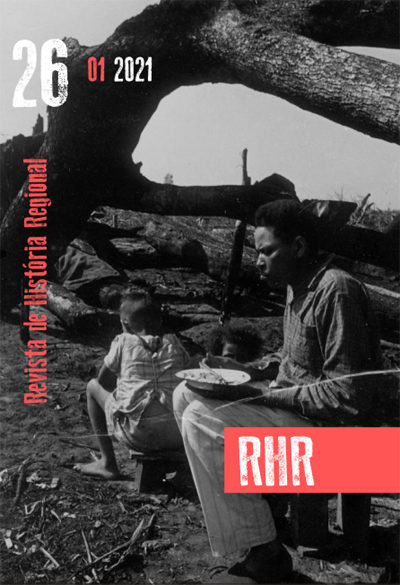Paisagem agrária ao sul do Império do Brasil: pecuária, pequena agricultura e diversificação produtiva (Bagé, c.1820-1870)
Abstract
Throughout the 19th century, the main economic activities in Rio Grande do Sul were the ones related to agriculture and livestock. The province was notable for its cattle raising activities and charque (or salted beef) production, which linked the region to the Atlantic economy. For a long time, historiography insisted on this image: the society in the borderlands was characterized by the presence of large cattle ranches (estâncias) and the predominance of free labor (via peonage). In the last decades, however, several studies highlighted the existence of small and medium agricultural properties and the undeniable importance of enslaved labor as well as that production activities went beyond cattle ranching. This work focus on the latter point, with special attention to Bagé, one of the municipalities best known for its livestock specialization. Through an analysis of post mortem inventories between approximately 1820 and 1870, as well as other sources, we show that the region was specialized in cattle breeding, but also the specific ways in which ranching combined with a myriad of other activities: food farming and sheep, horse and mule raising.
Keywords: 19th century Brazil; agrarian landscape; production diversity.
Downloads
Downloads
Published
How to Cite
Issue
Section
License
Copyright (c) 2021 Marcelo Santos Matheus, Luís Augusto Ebling Farinatti

This work is licensed under a Creative Commons Attribution 4.0 International License.
Autores que publicam nesta revista concordam com os seguintes termos:
a) Os autores mantêm os direitos autorais e concedem à revista o direito de primeira publicação, com o trabalho simultaneamente licenciado sob a Creative Commons Attribution License que permite o compartilhamento do trabalho com reconhecimento da sua autoria e publicação inicial nesta revista.
b) Os autores são autorizados a assinarem contratos adicionais, separadamente, para distribuição não exclusiva da versão publicada nesta revista (por exemplo, em repositórios institucionais ou capítulos de livros), com reconhecimento da sua autoria e publicação inicial nesta revista).
c) Os autores são estimulados a publicar e distribuir a versão onlline do artigo (por exemplo, em repositórios institucionais ou em sua página pessoal), considerando que isso pode gerar alterações produtivas, bem como aumentar o impacto e as citações do artigo publicado.
d) Esta revista proporciona acesso público a todo o seu conteúdo, uma vez que isso permite uma maior visibilidade e alcance dos artigos e resenhas publicados. Para maiores informações sobre esta abordagem, visite Public Knowledge Project, projeto que desenvolveu este sistema para melhorar a qualidade acadêmica e pública da pesquisa, distribuindo o OJS assim como outros softwares de apoio ao sistema de publicação de acesso público a fontes acadêmicas.
e) Os nomes e endereços de e-mail neste site serão usados exclusivamente para os propósitos da revista, não estando disponíveis para outros fins.

Este obra está licenciado com uma Licença Creative Commons Atribuição 4.0 Internacional.

Este obra está bajo una licencia de Creative Commons Reconocimiento 4.0 Internacional.






